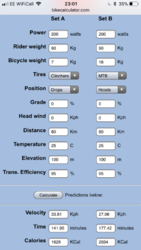cyberknight
As long as I breathe, I attack.
- Location
- Land of confusion
+1This cracked me up. Not the fact that the gains are marketing hype, but the comparison and your suggestion.
You compare a 15kg mountain bike and a 7kg road bike and suggest that “a poop” before riding cancels the difference out. Now, we are all different, but if you’re taking an 8kg “poop” then the type of bike you have is the least of your worries!
my slicked mtb gotta weigh close to 20 kg with panniers etc, i have drop bars on it and can get a good aero tuck but theres no way i would take it on a club run , its a beast to keep over 18 mph and on the hills you just die if you want to keep any semblance of speed.Caught a guy on a road bike the other day on the flat and gave him a draft , soon as we hit an incline he left me for dead.



